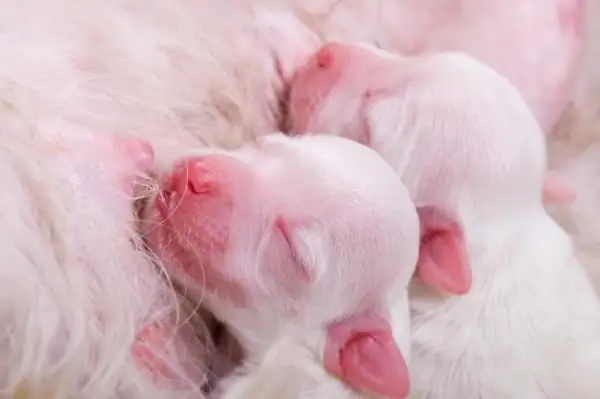2026 Author: Priscilla Miln | miln@babymagazinclub.com. Last modified: 2025-01-22 17:55:26
New parents feel a great responsibility towards their newborn baby. They take care of him in every possible way and protect him, protecting him from hypothermia and viral diseases. Meanwhile, some time after discharge from the hospital, most babies still have a runny nose. Parents start to panic: what to do, how and how to treat such a baby, because he doesn’t even know how to blow his nose?
Before resorting to any means of drug treatment, you first need to find out the nature of this disease. Perhaps this is just a physiological runny nose of newborns. About what this condition is, what are the causes of its appearance, and how to treat it, we will tell in detail in our article.
What is the physiological rhinitis of newborns?
It is worth noting that there are three types of rhinitis: infectious (viral or bacterial), allergic and physiological. Let's talk about the latter in more detail.
Physiological runny nose in a newborn is the appearance of mucous discharge from the nosebaby in the first weeks of his life. “It arose without a reason,” is what people say about this type of rhinitis. Indeed, the physiological runny nose both appears suddenly and disappears unexpectedly, even if it is not treated at all. As a rule, he does not cause any discomfort to the baby, except for rare cases when the baby's nose stops breathing well, which can cause him anxiety.

To understand the nature of this runny nose, you need to understand the causes of its occurrence.
Causes of the problem
The main cause of the physiological runny nose in infants is the immaturity of the nasal mucosa. The fact is that in the womb the child was in an aquatic environment, where the aforementioned mucous membrane of his nose was constantly moistened. After his birth, the baby finds himself in completely different conditions, and he, his organs and systems need to adapt to live in them. Until this happens, the mucosa needs additional moisture, and the baby's body begins to produce a special substance. The physiological runny nose in a newborn is a protective reaction of his body to external stimuli.
Since the cause of the described phenomenon lies not at all in viruses, allergens or bacteria, but in the immaturity of some organs and systems of the baby, it is also called neurovegetative.
Physiological rhinitis in newborns: symptoms
The reason for the appearance of rhinitis in infants became clear. But how can you be sure it's the right one?the most physiological runny nose in a newborn? The symptoms of such rhinitis are as follows:
- the child is cheerful and cheerful, sleep and appetite are not disturbed;
- the detachable mucus is transparent, has a liquid consistency;
- runny nose often accompanied by sneezing;
- breathing is generally not difficult (provided there is sufficient humidity in the room);
- excessive amount of mucus (with dry air in the baby's room) causes crusting in the nose, making it difficult to breathe;
- during sleep, the child breathes through the mouth;
- during breastfeeding in the supine position, due to breathing difficulties, the baby becomes restless and refuses to breastfeed.

Thus, in some cases, physiological rhinitis still leads to disruption of the usual rhythm of life of the mother and the newborn.
What to treat?
Use any medication, especially vasoconstrictor, for the treatment of physiological rhinitis is strictly prohibited. This can lead to the fact that the mucous membrane will dry out, and the next time the mucus will be produced even more than before. All treatment of physiological rhinitis in newborns is limited only by instillation into the baby's nose, in case of emergency, a solution of sea s alt. You can prepare it from a teaspoon of s alt and a liter of boiled water. With this solution, you can remove the crusts formed as a result of dry air from the nose and thus make breathing easier for the newborn.

In addition, the following remedies will help alleviate the condition of the baby during this period of life:
- humidifier should be used regularly in the room, humidity in the room where the baby sleeps should be maintained at 60%;
- the air temperature in the room should be 20-22 degrees, if the house is heated too much, it would be appropriate to put special thermostats on the batteries;
- the room should be regularly ventilated;
- wet cleaning should be done regularly.
All these tools will help to transfer the described state easily and quickly.
Duration
Consider how long a physiological runny nose in a newborn lasts. The immature nasal mucosa of a newborn baby is finally formed only by the age of 2.5-3 months. On average, such rhinitis lasts no more than 10-14 days. This happens when parents do not interfere in the natural physiological process and do not try to dry the nasal mucosa with additional means, which is extremely rare. The most common situation is when the mother actively seeks to remove mucus from the nose, greatly drying it out.

In this case, the runny nose in the baby lasts how long? Physiological runny nose in a newborn with irrational treatment can last for a very long time. In some cases, such unjustified use of medications, especially vasoconstrictor drugs, can lead to chronic rhinitis, get rid ofwhich will be impossible even in adulthood.
Danger for newborns
In some cases, due to rash actions, inaction of parents or for a number of other reasons, neurovegetative rhinitis leads to complications.

Physiological runny nose in a newborn is dangerous as follows:
- Baby stops gaining weight and even loses it, as he cannot suckle normally due to nasal congestion.
- With a prolonged runny nose, the nasal mucosa is so irritated that painful ulcers form on it.
- Due to a prolonged runny nose, the baby may develop inflammation of the ear and upper respiratory tract. The newborn develops a cough that will still need to be treated to avoid complications such as acute bronchitis and pneumonia.
Cough with physiological runny nose in babies: how to treat
Before prescribing therapy for a cough caused by a physiological cold, the severity of the complication is determined. In most cases, it is a reflex reaction of the body to the abundant secretion of mucus during a runny nose. How does this happen? In this case, the mucus simply flows down the back wall of the nasopharynx, thereby interfering with the child, and he reflexively coughs it up.
Cough with a physiological runny nose in a newborn in this case is treated by eliminating the cause of its occurrence, that is, removing mucus from the nose. In turn, in order to get rid of it, it is required to create favorableindoor conditions: humidify the air, regularly ventilate the room and maintain an optimal temperature regime in it. In this case, the child must be under constant medical supervision until the complete disappearance of all symptoms of the disease.
Opinion of pediatrician Komarovsky E. O
Dr. Komarovsky gives his assessment of the physiological runny nose. He emphasizes that it is strictly forbidden to treat rhinitis that occurs in the first trimester of a baby's life with medications. This is not the runny nose that is eliminated. It is associated with the adaptation of the nasal mucosa to the composition of the ambient air. Once this happens, the rhinitis will go away on its own. That is why you should not treat a physiological runny nose in a newborn.

Komarovsky recommends creating favorable conditions for the child in the room to naturally moisturize the mucous membrane and prevent it from drying out. The doctor is outraged that some mothers try to bury their baby's nose with breast milk, considering it a panacea for all diseases, and especially for the common cold. In fact, this is completely pointless, especially since there are more effective and simple ways that can quickly alleviate the condition of the newborn.
Prevention
The type of runny nose in question proceeds without fever and does not need medical treatment, but it also cannot be avoided. The task of the mother is to alleviate the condition of the baby during this period and do everything possible so that it ends as soon as possible.faster and without consequences.

For this you need:
- maintain optimal temperature and humidity levels in the room;
- for additional moisture, bury the child's nose with saline;
- timely clean the nose from dry crusts with cotton swabs and flagella.
The above preventive measures will help you quickly forget what a physiological runny nose is in a newborn. Meanwhile, it is worth remembering that the optimal temperature regime and air humidification are always necessary for the child to grow up he althy and active.
Recommended:
How to cure a runny nose in a child: ways and means

The warmest and most sincere feeling in the world is mother's love. Since our birth, she has been taking care of us and trying to protect us from everything. First, the baby's immunity is strengthened by breast milk, then the baby gradually begins to get used to the outside world. Eat cereals, get up on your feet, walk without a mother's hand. But, unfortunately, the child is not protected from various diseases
How to treat a runny nose in a one-year-old child: proven remedies, reviews

When a one-year-old child has a cough and runny nose, parents begin to worry and fuss. The kid is naughty, sleeps badly at night. A clogged nose prevents the baby from breathing and eating normally. Colds require urgent treatment. A severe runny nose is an unpleasant problem, but solvable. Timely treatment of a runny nose in a one-year-old child will quickly alleviate his condition and prevent the aggravation of the disease
How to treat a runny nose in a newborn baby?

Rhinitis is quite common at any age. And newborns are no exception. How to fix the problem and help the baby? Recommendations - in the article
How long does pregnancy last in dogs. How many months does pregnancy last in dogs

Pregnancy in dogs is multiple. It is very difficult to calculate the exact date of birth, because the onset of pregnancy occurs in animals without symptoms or they are not pronounced. There are cases of a false course of pregnancy, in which case false symptoms are easy to mistake for real ones. The date of birth is influenced by many factors, one of which is the course of pregnancy. How long does pregnancy last in dogs?
From what week does toxicosis begin during pregnancy? How long does toxicosis last in pregnant women

It is generally accepted that toxicosis necessarily accompanies every pregnancy. Many perceive morning sickness as an integral attribute, as well as the first symptom that a woman is in a position. In fact, everything is very individual. One lady is prescribed corrective treatment to stop severe nausea. Others, on the contrary, having endured several children, do not know what it is. Today we’ll talk about what week toxicosis begins during pregnancy

